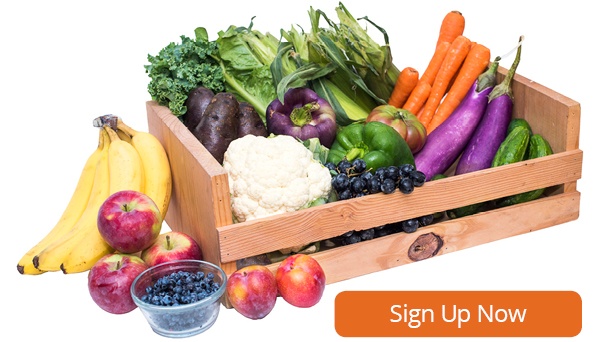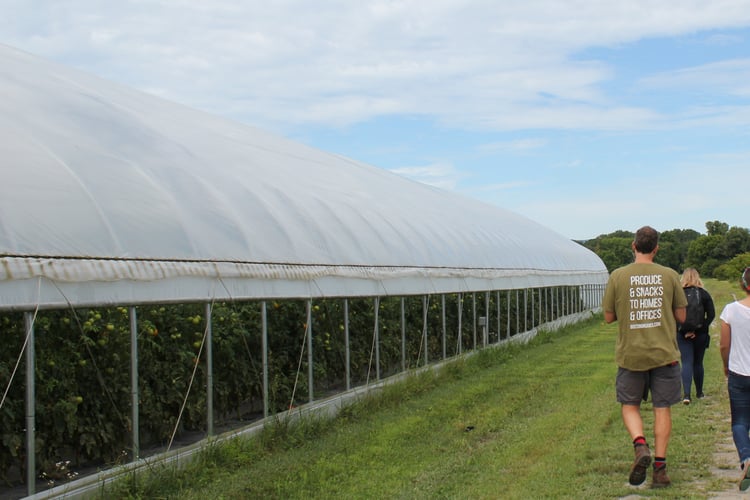
We know you value organic produce for the benefits it has both on your health and the environment. But as a busy Bostononian, you might not have time to visit the source -- the farms. At Boston Organics, we also value transparency in the supply chain and make sure that the food you eat comes from truly sustainable operations.
Every season we like to visit growers that are a part of our network. Not only does this help maintain our strong working relationships, but it also gives us an opportunity to ask questions and see how they continue to make positive changes on their farms.
Earlier this summer, we sent a few members of the Boston Organics Crew to western Massachusetts for a few of these visits. Here’s how our day went.
Atlas farm - South Deerfield, MA
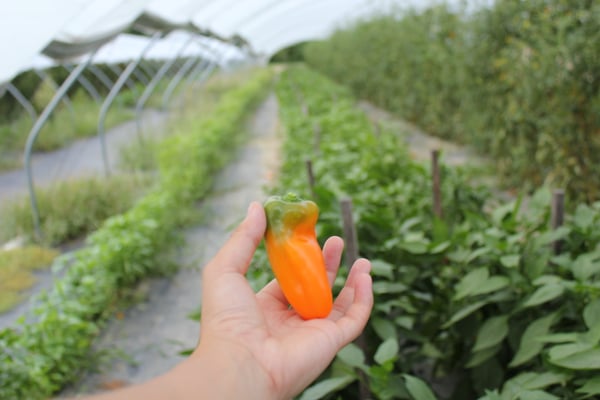
Snacking pepper grown in Atlas Farms' high tunnel.
Troy, who is the packinghouse manager, showed the Boston Organics Crew around the farm. Atlas Farm is in the process of building a new bio-mass energy system that will be contained in these storage containers (see pic below). This system will turn organic matter into energy that they use on their farm. The solar power utilized on their farm powers 60% of all of their electrical needs on the farm and Atlas Farm Store.
As farmer/owner Gideon Porth describes: "We need to act swiftly to reduce CO2 emissions. There are many ways to achieve this goal and we believe that using biomass fuel for heat is one of the solutions. As with most homes and businesses, our farm's heating needs are currently met almost entirely with fossil fuels, specifically propane. We currently burn over 20,000 gallons of propane per year to heat our greenhouses, packing house, offices, and labor housing. The burning of fossil fuels releases sequestered carbon into the atmosphere but has no capacity to recapture these carbon emissions. Like all other biofuels, biomass completes this loop. The carbon emitted from burning wood is recaptured as trees grow, thus providing a renewable fuel source that is also carbon neutral over time. By switching from propane to biomass, we will reduce our carbon emissions by 430 tons of CO2 per year."
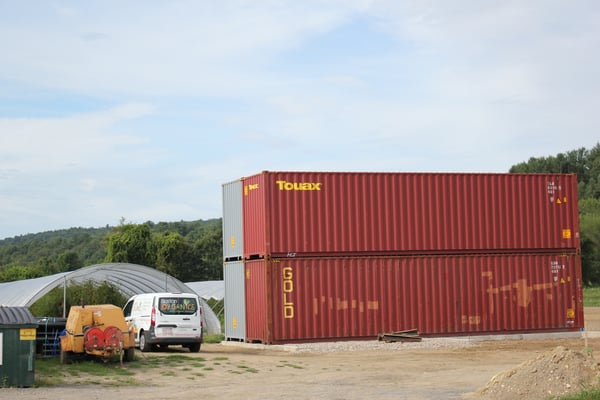 Atlas Farm's bio-mass system
Atlas Farm's bio-mass system
This summer we offered a bulk add-on item of tomato seconds (20 lb in 1 case) that were grown at Atlas Farm. These "seconds" have been set aside for physical imperfections like blemishes or uneven ripening. Though they may be a little imperfect, they're still delicious in a marinara, sauce, spread, or stew.
kitchen garden farm - sunderland, ma
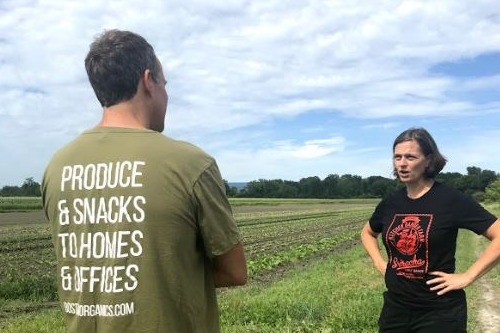
Jeff (left) and Caroline Pam (right) co-owner of Kitchen Garden Farm
Less than 10 miles from Atlas Farm is one of Kitchen Garden Farm's (KGF) fields. We met up with Caroline Pam (co-owner/founder). KGF is committed to growing healthy soils by growing/harvesting biodiverse crops, improving crop rotation, and utilizing cover crops. They do this by having multiple fields in production at different times. The field in Sunderland was taking a bit of a rest. Over time with help from compost and other organic material, the soil will regain more nutrients and be ready for another season's harvest.
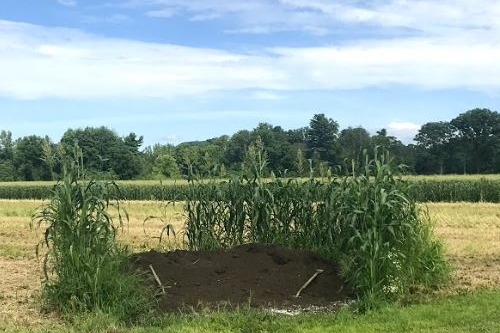 KGF's compost pile is so nutrient rich, that the surround corn stalks significantly grew before the compost was spread on the field.
KGF's compost pile is so nutrient rich, that the surround corn stalks significantly grew before the compost was spread on the field.
While the fields were calm, the newest addition to the farm was bustling -- their very own kitchen! Decked out with new interior walls and $180,000 worth of equipment (1), KGF can now harvest and cook chilis, pepper, tomatillos, etc. the same day they were harvested. Talk about fresh! Add their sauces to your next order!
Lunch Break at Mi Tierra - Springfield, MA
While we were in the area, we had to check out Mi Tierra for lunch! In 2013 their restaurant tragically burned down, but with help from the local community and local farmer Michael Docter (Winter Moon Roots) they were able to rebuild, reopen, and continue growing their business! While Mi Tierra was getting its footing, Jorge and Dora (owners of Mi Tierra) set up a small space at Winter Moon Roots Farm to produce their famous corn tortillas and chips.
Winter moon Roots - Hadley, MA
Winter Moon's schedule is almost opposite of what you would think of for a farmer in the northeast - the fields lay low in the summer, and in the fall and winter they are busy growing, harvesting and storing a variety of root crops. We met up with Rosendo (who will eventually tend to the fields year-round) while Michael was away.
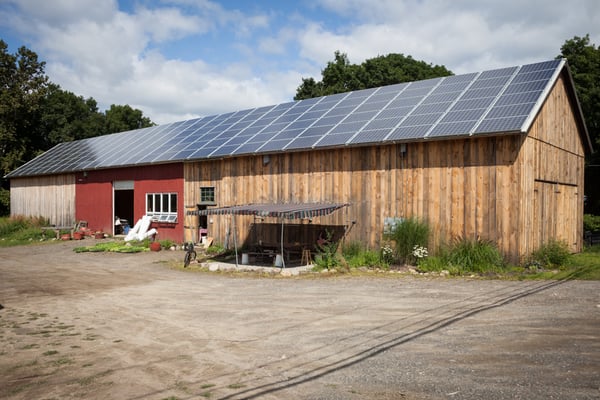 Solar panels on Winter Moon's barn powers their computers, lights, and refrigeration. Winter Moon Roots' goal is have carbon-neutral operations.
Solar panels on Winter Moon's barn powers their computers, lights, and refrigeration. Winter Moon Roots' goal is have carbon-neutral operations.

Solar panels cover the entire roof of their barn. Winter Roots aspires to be carbon-neutral. They achieve this by using renewable energy, delivering wholesale and local CSAs by cargo bike, and using a computer-controlled system of fans/refrigeration units to mix cold winter air from outside with refrigerated air to produce the right temperatures needed for happy root vegetables with low energy cost. In the peak of their harvesting, their root crops will fill 2-3 storage rooms (gif of 1 storage room) almost completely to the ceiling!
Rosendo and his crew had already begun planting crops for this upcoming winter harvest. Similar to The Kitchen Garden, Winter Moon Roots have fields that lie dormant. To reintroduce nutrients back into the soil, peas and soy beans were scattered over their field as compost/organic matter. On one of their active fields, tiny carrot tops were just peaking through the soil. Rosendo grabbed a few of these month-and-a-half old carrots for us to taste. Though teeny-tiny, these carrots were so sweet and flavorful. We expect them to get even better for our winter deliveries!
Rosendo and the crew will start harvesting the first winter crops around November.
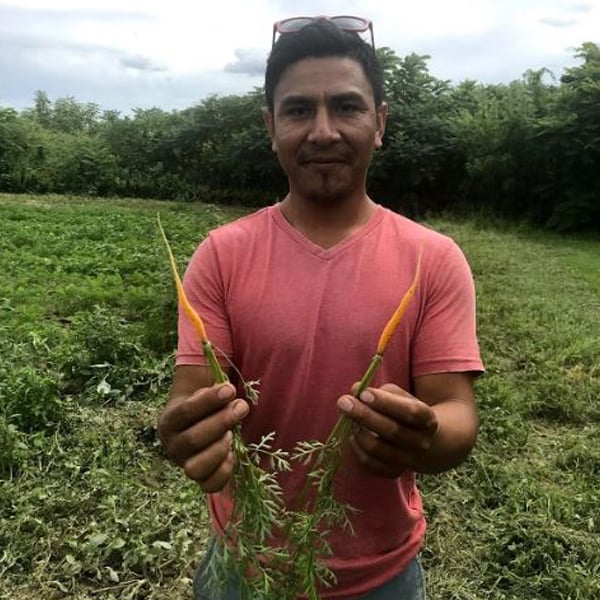 Rosendo picked newly planted carrots from Winter Moon Roots.
Rosendo picked newly planted carrots from Winter Moon Roots.
As always, we're grateful to have a great relationship with our farmers and to continue to make positive changes in our food system. When we support each other, we are connecting everyone to the freshest possible food and supporting each others' positive missions.
Are you committed to eating only local? Try out our Dogma Box or see what else is local in our other boxes.
What is your favorite produce box and why? Comment below!



